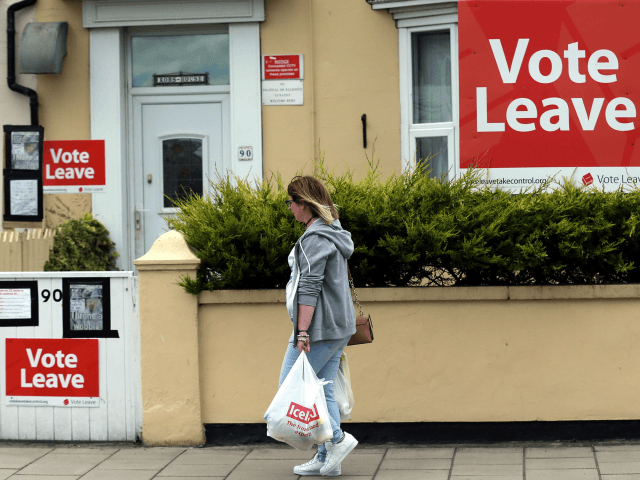AFP – “This whole seafront was packed with boats,” said Vicky Thwaites, surveying the broad beach at Redcar, a once-prosperous town that voted overwhelmingly for Britain to leave the EU.
“Now we call it Deadcar. We just feel that nobody cares.”
Thursday’s dramatic vote to quit the European Union was driven by millions of people in the post-industrial north and centre of England, in working-class towns like Redcar, on the northeast coast.
The strength of feeling may have stunned metropolitan Britain, but came as no surprise in places like Redcar, where 66.2 percent ultimately voted to leave the EU.
The town’s century as a seaside holiday destination died out with the 1960s; after Britain joined the European common market in 1973 its fishing fleet was next; and its skyline-dominating steelworks, which produced the steel for Sydney Harbour Bridge, was mothballed by its Thai owners in 2015.
“My dad had two boats,” said Thwaites, who volunteers at the Zetland Lifeboat Museum, a local history treasure trove which houses the world’s oldest surviving lifeboat, built in 1802.
“We all thought being in the Common Market was brilliant.
“Then the boats were decommissioned. They couldn’t sell the fish anymore.
“They took our fishing from us and took our steel. The backbone of Britain. They’ve raped the northeast. We’re left with nothing. We’re all just fed up and want Britain back.
“We are lovely, friendly people. But we just feel that we’ve lost this country,” she said, the deep emotion evident in her voice.
Thwaites, a former nurse said people had voted Leave “out of love” for Britain.
– Sense of loss –
With a population of 36,000, Redcar, sits on the River Tees estuary. The Teesside skyline is punctuated with chimneys, bright flames and electricity pylons.
Redcar originally boomed as a seaside resort from the 1850s.
Archive photographs in the museum show a jolly world of bandstands, swimming baths, promenades and piers, entertainers, rollercoasters and small fishing boats.
The Yorkshire town’s historic clock tower centrepiece is dedicated to king Edward VII, who liked to visit.
Now its high street resembles many in provincial England: a mixture of bakeries, cafes, betting shops, England flag-bedecked pubs showing football, tattoo parlours and charity shops.
Walking past the clock tower, Keith Robson, 60, was proudly wearing an England football shirt signed by several players.
“I voted Leave on the principle that the Prime Minister David Cameron promised us that he wasn’t going to let more than 100,000 immigrants into this country,” he said.
“A lot of the people coming in are from poorer nations and willing to work for less money. I think that’s all wrong.
“In the northeast, we’ve lost the mines, the shipbuilding and now the steelworks. What’s left?”
While there are some Remain voters, they are outnumbered by trenchant Leave voters.
“I voted to go out,” said Off The Vine bakery owner Maxine Liddle. “I’ve no regrets at all.”
– Self-esteem ‘stripped away’ –
BBC political interviewer Andrew Marr, who wrote “A History of Modern Britain”, surmised the referendum result as “the rebellion of the diminished against the cocky, the ignored against the shapers of modern times and the struggling against the strutting”.
The disconnect with Britain’s power base capital city is evident, and not just from the contrasting referendum results.
An on-the-day return train fare to London, 350 kilometres (220 miles) away, costs £271 (327 euros, $361): less than a week’s summer holiday in Cyprus, including flights, as advertised in Redcar’s travel agencies.
“A lot of people voted out in this area because they’re always getting sidelined. London gets all the attention,” said Stan, 69, a pensioner.
“The EU has stuffed a lot of people,” he added.
The EU’s flag flies next to Britain’s Union Jack outside the Redcar and Cleveland Council local authority’s smart new offices, built partly with EU money.
The esplanade’s centrepiece, the Redcar Beacon, a “vertical pier”, was also EU-funded.
But there is scant popular enthusiasm for Brussels.
Close by the landmark, a boarded-up seafront building bears a prominent placard reading “Say NO: Believe in Britain”, the O formed of the EU’s ring of stars.
Redcar, like much of industrial northern England, is a traditional Labour stronghold, but the party’s Remain message “went in one ear and out the other”, said David Walsh, the local council’s Labour deputy leader.
“Thirty years ago, this area had some of the highest per capita wages in the UK. That’s utterly gone,” he told AFP.
“When self-esteem is stripped away, there is anger.”

COMMENTS
Please let us know if you're having issues with commenting.